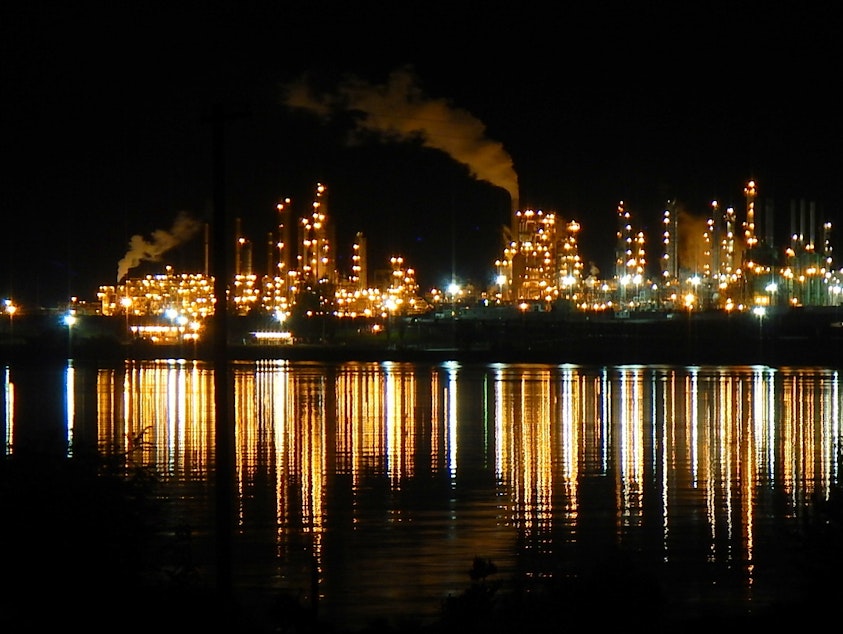How George HW Bush's pollution solution put Washington state's climate strategy in the crosshairs

Washington state, like places all over the world, is grappling with the effects of climate change. In response, the state is trying to get its big polluters to burn less fossil fuel.
The tool it's using is called a carbon auction. But the fate of that carbon auction now comes down to a vote this fall.
So what exactly is a carbon auction?
To understand that, you have to go back to the 1980s. Back then, parts of America were suffering from a problem called acid rain. It corroded buildings and statues and poisoned plants and wildlife. It was caused by air pollutants like sulphur dioxide.
And so, President George Bush (the older one), championed a "cap and trade" program. It required places that emitted these air pollutants to pay for doing so.
At the time, it was considered a more business-friendly alternative to strict emission standards, because it gradually increased pressure, but let polluters decide when it was worth making changes.
"This landmark legislation will reduce air pollution each year by 56 billion pounds," said Bush when he spoke about it. That’s about the weight of five Egyptian pyramids.
Sponsored
Many experts claim that cap-and-trade program is why acid rain no longer poses the threat in this country that it once did.
RELATED: Booming Episode: Could paying more for gas save you money?
T
oday, the problem is carbon, one of the main drivers of climate change.
Sponsored
So, Washington state is following that example from the 1980s. It now auctions off the right to emit carbon pollution.
Four times a year, the state’s biggest polluters sign up to participate.
David Woodson bids for carbon allowances for the University of Washington.
On the day of the auction, he wakes up with butterflies in his stomach.
"I think it's just more like, like, eager anticipation, right?" Woodson said. "Like, you're wanting everything to go smoothly."
Sponsored
He’s bidding against oil refineries, manufacturers like Boeing, cities, and other big institutions like hospitals.
See a full list of the registered bidders for the recent September 2024 auction in this PDF
Each carbon credit gives these entities permission to emit a metric ton of carbon. That’s about the weight of a grand piano.
Y
ou might be wondering why the University of Washington needs carbon credits. It's for heating classrooms.
Sponsored
The university burns natural gas to produce steam in five huge boilers.
"We then distribute that steam through eight and a half miles of tunnels, pipes and tunnels, out to all the buildings on campus," Woodson explained.
Every time there’s an auction, there are fewer carbon allowances available to buy. That’s by design. Because the goal is to reduce the state’s carbon emissions 95% by 2050.
When there’s fewer carbon allowances to bid on, the price goes up over time. Those higher prices shape behavior.
For example, the UW is looking at a technology that harvests heat from sewage, rather than fossil fuels.
Sponsored
"All's we're interested in is the warmth in the water," Woodson said. "So think of when you have a shower in the morning and that warm water goes down the drain.”
Now the UW can apply for a grant from the state to help pay for the new technology. The state pays for these kinds of upgrades with the profits it receives from the carbon auction.
This interactive map created by Washington state shows where funding is being spent.
B
ut not everyone trusts the state to spend that money responsibly.
"I believe there should be this incredible responsibility to manage the money as if it were your own," said Brian Heywood, the wealthy investor who wants these auctions to end. "Instead I see Jay Inslee going around like he's the head of the lollipop guild, you know, here's a million dollars for you, here's a million dollars for you."
Heywood made his money investing in Japanese companies. He helped pay for the ground operation to get Initiative 2117 on the ballot. It would repeal the Climate Commitment Act and ban carbon auctions in the state now and forever.
RELATED: Why Washington tribes are fighting effort to gut the state's Climate Commitment Act
Economists all over the world are watching this election. That's because Washington state has been a model for these programs. It was one of the first carbon markets in the U.S, along with California. And the U.S. is one of the biggest carbon emitters on the planet.
Hear more about the economic forces shaping our lives in the Pacific Northwest on KUOW's Booming.
Search for Booming in your favorite podcast app.




